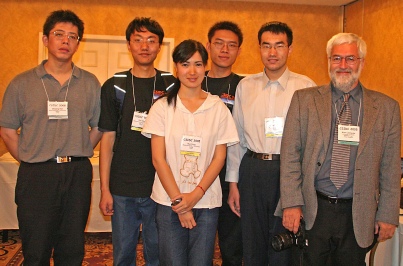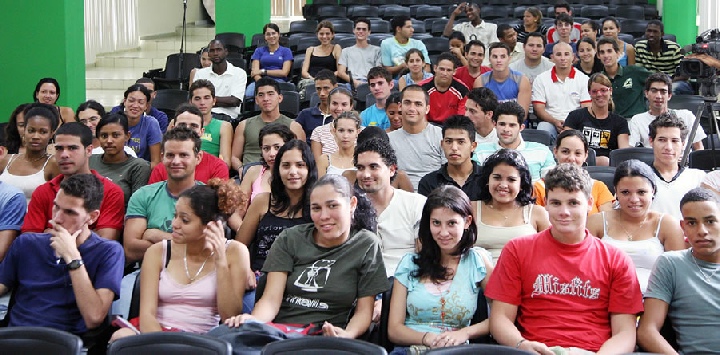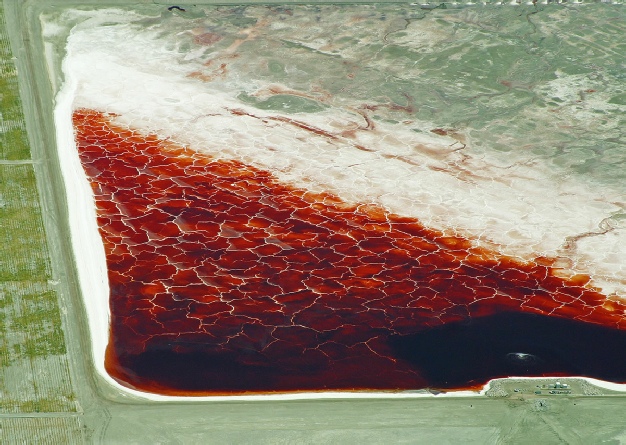In 2002, I was awarded a National Teaching Fellowship. This was an award given to the twenty “top” teachers throughout British universities. I was lucky enough to get one; the actual award was to be used to spend on educational projects. The following is an article about how it changed my life. It gives you an idea of what I did before a retired from education.
What being a National Teaching Fellow did for me!
Posted on March 3, 2014
Article by Professor Alan Clements
University of Teesside
NTF 2002
Becoming a National Teaching Fellow was probably the most important event in my academic life; it’s certainly the event that had most impact on me both personally and professionally. This article is a brief account of how I came to be a NTF and how it affected me.

Alan with students from Beijing at the 2005 Computer Society conference.
I’m was in one of the first few batches of National Teaching Fellows, although I never set out to be an NTF and assumed that it was for those who knew about education, or, at least, the theory of it. A memo came round about NTFs and one of my colleagues, one of the very first NTFs, suggested that I should apply – largely because of my work in computer science education (e.g., writing textbooks and working with curricula committees). Anyway, I did apply and became a National Teaching Fellow.
Becoming an NTF had a profound effect on the course of my life. In my case, you could say that the NTF was an enabling mechanism that helped me do many of the things I wanted to do. I was very lucky because the management at the University of Teesside appreciated NTFs and was always very supportive of my work.
Promoting education can take place at many levels; for example, education theory and best practice, enhancing the local environment, and advancing the global environment. Long before I became an NTF, I had been an author of textbooks and was also involved with the body that represents the computing profession at all levels, the IEEE Computer Society. Fortunately, I was able to apply some of my NTF goals to both writing and computer science education.
Photo from a US trip in 2004.
In the IEEE CS I was a member of their educational activities board and took over leadership of their CSIDC, Computer Society International Design Competition. I managed to find the right person at the right time in Microsoft and they gave me $1M to implement the competition for several years. Bringing $1M to the society allowed me to select the theme of the competition and its parameters. I was aware that computing was associated in many people’s minds with geekiness, gaming, and surfing the web. I wanted to dispel this misconception and demonstrate its importance and its social usefulness. The themes of the competitions I organized stressed this approach to computer science. Moreover, addressing the popular perception of computer science might also reduce the gender imbalance amongst students. Essentially, teams of five students (undergraduates) from all over the world were asked to design a computer-
A typical finalist entry in the competition was a group of students who used a cheap webcam to monitor a person’s movements at home. If the person made coordinated movements, all was well. If he or she made uncoordinated movements (e.g., falling or collapsing), an alarm was sounded. The students used the camera to convert an image into stick-
As well as promoting CS education, the competition allowed students in countries such as Romania, that had previously been isolated, to take part in a world-
The competition had a surprising personal effect on me. I also ran a history competition to celebrate the 60th anniversary of the Computer Society. Again, I was able to influence the direction and asked students to write about computer history – not the traditional history of the established famous inventors but unsung heroes from their own countries; for example, the team from Japan discussed the history of computing in Japanese railways.
I occasionally received requests to take part from countries that were not on the US State Department’s Christmas card list; specifically Iran and Cuba. I told those writing to me that they could take part in the competition as the IEEE CS was an international organization. I said that they could win but they could not receive a prize because of US export restrictions.

Alan visiting Cuba in 2009 and giving a lecture to students.
The professor in Cuba who contacted me, knew of me because of my books and because of a shared interest in computer history. He invited me to visit him at his university. I did so and was quite amazed to discover that the university was built on the site of the former Soviet base that housed the nuclear missiles at the time of the Cuban Missile Crisis. In fact, I was made a visiting professor and visited the university three times. These visits provided some of the most fascinating and enjoyable moments of my life.
As well as my visit to Cuba, my academic work earned me a visit to the West Point Military Academy in the USA, where I gave a talk on a topic that included two of my greatest interests, computer science (professional) and aviation (personal): “Can you trust computers to fly aircraft”. This was an interesting visit, walking round a campus where students saluted their lecturers (I should be so lucky) and where trash cans were labelled ‘secret’ and ‘non-
As a National Teaching Fellow and a classroom teacher in a northern university where most students are first-
I’ve now retired from full time teaching and am an Emeritus Professor. I haven’t stopped my work. At the moment I’m developing a website on computer architecture (i.e., the design and operation of computers) that covers my discipline more widely than others (at least, that’s my goal). For example, I include history and ethical considerations; both topics included in the formal curriculum but often omitted because of the pressure to cover more ‘practical’ topics in the curriculum. I have recently started writing to academics and asking them to suggest topics that their students find difficult in traditional texts (including my own). I then write an article to help deal with some of the misconceptions students have. I’ve added material at the request of US academics and even one in Iran who could not afford expensive western textbooks.

Aerial photo of Lake Powell, Arizona.
When I look back on my life as a NTF, I ask myself what I gained from it. Ironically, the answer is, ‘more of that which won me the NTF in the first place’. And that’s the ability to seize opportunities when they arise. I began my academic career by thinking I could write a better book than someone else; and I did, and that put me on the path to a NTF. Once, I had the NTF I took the opportunities that arose because of it. If I have one regret about my professional life, it’s that I didn’t take all the opportunities that arose.
Alan is a retired Professor of Computing at the University of Teesside, and also a keen photographer.
